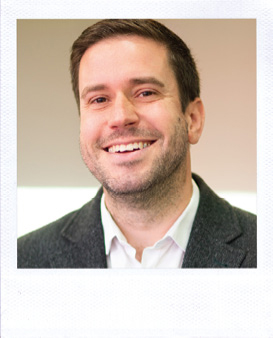 THE DIGITAL EXPERT’S VIEW
THE DIGITAL EXPERT’S VIEW
DAVID ATTOE,
IOT DEVELOPMENT DIRECTOR, CLOUDFM
As the economy emerged from the pandemic, businesses of all sizes have had to navigate a series of challenges. As we look forward to 2023, we can expect many of these issues to be amplified alongside a tightening of the economy and possible recession.
Rising costs of labour and materials have proven a challenge and required careful attention over the last couple of years. It requires a greater focus on flexibility in how programmes are delivered and a constant recruitment effort to ensure the resources are there to undertake the work. While a recession may increase the number of people in the labour market, it is unlikely that it will solve the long-term skills shortage that has plagued our sector.
We have created and deployed new technology to address these challenges, as digital transformation can provide clear benefits to the sector as a whole. Technology underpins efficient performance that is delivered by the right people for the job and efficient processes. It can provide a management process with no gaps in information, no manipulated data, and therefore better relationships with supply chain partners.
It is also essential to accelerate the journey to net zero. It’s the responsible thing to do and delivers energy cost savings. Internet of Things (IoT) technology can significantly impact energy usage in buildings and give staff the information they need to make positive behavioural decisions.
Information on carbon emissions should be made available in an intuitive platform that enables users to make quick and straightforward choices regarding energy use, such as turning off the hot water boiler after hours or turning off the electricity to floors when no one is there.
We have developed patent-pending technology that uses IoT, Machine Learning and Artificial Intelligence to monitor buildings and all mechanical assets within those buildings. Extensive trials in the hospitality industry and NHS have shown that the technology, when combined with behavioural science, reduces energy consumption by at least 20 per cent. A substantial monetary saving and a significant CO2 reduction.
Better use of data through the supply chain can create a new era of transparency that allows problems to be fixed faster the first time around. In addition, it will enable pressured staff to focus on delivering a great customer experience while saving money and benefiting the environment.
By combining real-time data with the latest technology, FMs can deploy greater localism in sourcing facilities management engineers and reduce the carbon footprint of activity through reduced travel. To address this, the model built greater flexibility into the system, using available intelligence to match the right skills to the job at the first visit.
Flexibility will be vital in tackling the challenges that the economy faces over the next couple of years. It is clear that good data is essential to inform better decision-making, which in turn drives efficiency.
 THE INTEGRATED FM PROVIDER’S VIEW
THE INTEGRATED FM PROVIDER’S VIEW
JOHN MCPHERSON,
ABM MANAGING DIRECTOR
Throughout the past 12 months, the facilities management sector has once again shown how responsive, flexible and adaptable it can be to evolving external factors; whether political, economic, social or technological. As we approach the new year with continued fiscal uncertainty around us, we must also continue to show our agility.
The resource shortage has been one of the biggest challenges facing many sectors, including facility services. Our strong culture and industry leadership serve as the foundation in making ABM a great place to work, but it is our innovative approach to attracting and retaining talent that makes the difference for us, particularly during these periods of uncertainty.
This could mean looking for new talent not just from the sectors we serve, but from different and new areas from outside the facilities management circle. We must approach recruitment with a fresh perspective and seek to recruit those individuals who will bring the correct mindset, attitude and focus, and then provide them with the necessary training and skills. This approach not only helps keep the talent base, but with diverse perspectives and backgrounds that all help provide the best experience for clients.
With regards to retention, we must always consider the investment we put in to training and development to ensure the creation of very clear career progression opportunities for those who desire growth. It’s important to look to the future, not just the here and now. Our J.E.E.P (Junior Engineering Engagement Programme) is an excellent example of this. We launched the programme specifically to address the skills gap and make sure that we are doing all we can as a company to promote our industry and equip the next generation of talent with the knowledge and skills required to work in this industry.
As the industry adjusts to a new approach to the working week, the care of buildings is front of mind, with customers needing to look for efficiencies while ensuring healthy environments. This is why we believe integrated facilities solutions will be so crucial in the years ahead.
A functioning facility is a complex combination of specialised components and systems, each with specific needs and challenges. Keeping it all running requires deep expertise in each area – and a full understanding of how each part works together. Historically specialised services have been supported by a variety of providers, but the more services one company can support, with expertise across a breadth of cleaning, maintenance, technical, security and other services, the more holistic and cost effective the facilities management operation becomes. This has never been more important, or attractive, to customers in difficult fiscal times.
Finally, it’s also important to recognise the role that sustainability will play next year and, in the years, to come. There is an increasing mindfulness of the environmental impact of operations, with businesses looking for new solutions to significantly reduce their carbon footprint and help in becoming more carbon neutral. Facilities management providers play a critical role and must increasingly collaborate with their clients to identify opportunities in successfully deploying sustainable, waste, and energy efficient practices.





